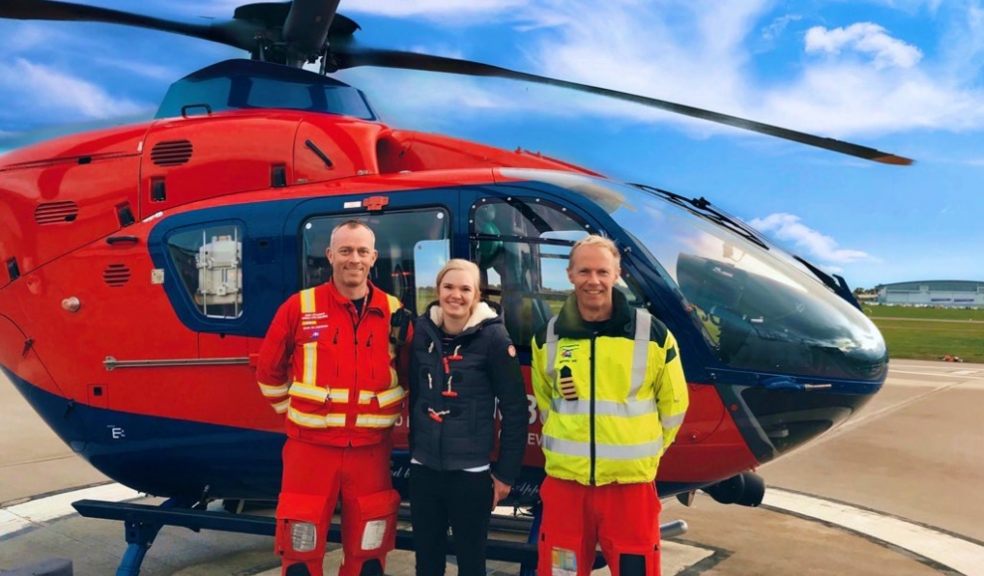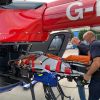
This World Patient Safety Day Devon Air Ambulance celebrates exemplary service
Devon Air Ambulance (DAA) is proud to join with the World Health Organisation on 17 September, 2020 for the first World Patient Safety Day.
The overall objective of the Day is to enhance the understanding of patient safety, increase public engagement in the safety of health care, enhance patient safety and reduce patient harm; firmly grounded in the fundamental of ‘Medicine – first, do no harm’.
However, Patient Safety isn’t something promoted on a single day; it sits at the heart of everything that Devon Air Ambulance does every day. From those delivering care to patients, to those essential ‘behind the scenes’ members of the team, a lot of hard work goes into ensuring the service is not only safe, but the welfare of patients and staff are at the forefront of everything it does.
Nigel Hare, Operations Director for DAA says:
“As an Independent Healthcare Provider registered with the Care Quality Commission, we actively support patient safety in a variety of ways. After each incident we respond to, the team is encouraged to reflect on the care they delivered. Unusual or challenging incidents, or those where the needs of the patient required advanced invention and treatment, are discussed at our monthly Clinical Governance days.
“Here as a team we reflect on the care we provided, consider what we could do to further improve the experiences of our patients, and ultimately seek to provide them with an even greater chance of a successful outcome. We also review the care we provided against national Quality Indicators as well as those we have established ourselves that we believe challenge us to provide the very best care to patients.”
DAA’s ‘Just Culture’ supports clinicians, pilots and support staff to report incidents where something didn’t go well and the team are actively encouraged to highlight ‘Near Misses’, where strong processes, the timely intervention of another clinician or simply due to good fortune, an incident that could have led to harm was avoided.
Open reporting of Incidents and Near Misses provides the opportunity to learn and help prevent future occurrences and helps identify the areas where they can reduce risk to patients and staff. This insight helps inform the training and simulation sessions delivered during the Clinical Governance days and during daily sessions at the airbases.
However, an important aspect of patient safety is understanding the perspective of our patients. DAA employs three Patient Liaison Clinicians who contact patients following their incident and offer ongoing support to them and/or their family. Where the patient is happy to share their experience with DAA, they seek to understand how the service treated them from their perspective.
With the patient’s consent, their experience is shared with not just the clinical team who treated them, but the wider team so everyone can learn from the experience of their patients, even if they didn’t care for them personally. Where possible, and where the patient has given their permission, these learnings are shared with other health care professionals who we worked alongside when treating the patient.
Nigel added:
“The valuable insight from our patients helps us not only to keep our future patients safe, but in what can often be very traumatic circumstances, helps us to ensure our patients ‘feel’ safe. Our experience has shown us that patients often have ongoing needs, even once they have been discharged from hospital. We have a network of charities and other agencies who provide short term and long-term support during recovery and rehabilitation and we can introduce our patients to them, further supporting their recovery and wellbeing. As patients embark on their recovery and rehabilitation, they may have financial challenges or need legal advice to support them with any changed circumstance they may find themselves in. We can provide details of specialist organisations that can support our patients in these areas, helping to keep them safe in a broader context.”
Sometimes, our patients have gaps in their recollection of the care we provided, or have questions about the treatment we provided, just as patient Beth said:
“I had no recollection of being airlifted, or of the crew that attended, so when I was discharged from hospital, I wrote to them to thank them for helping save my life. A few days later, I was contacted by a member of the team who’d seen my message. She was incredibly supportive and empathic about my amnesia around the helicopter and offered me the chance to come and meet the crew and see the helicopter. This offer meant the world to me and my recovery as it would give me the chance to see the people who saved my life and find out what had happened to me.
“The team from Devon Air Ambulance not only saved my life that day, they were there for me afterwards. They were so understanding of how traumatic not just my incident was, but the trauma that came from being airlifted itself. Something I’d never have been able to fully process without the Patient Liaison Team supporting me through.”
Identifying the care needs of patients and what is required to keep them safe sits at the heart of DAA’s decision making. From encouraging open reporting, identifying and addressing risks, learning from patients’ experience, keeping up to date with the latest research and evidence and their commitment to regular education, training and simulation, will help assure its supporters and the hundreds of patients they treat each year, that DAA is passionate about to keeping patients safe.














